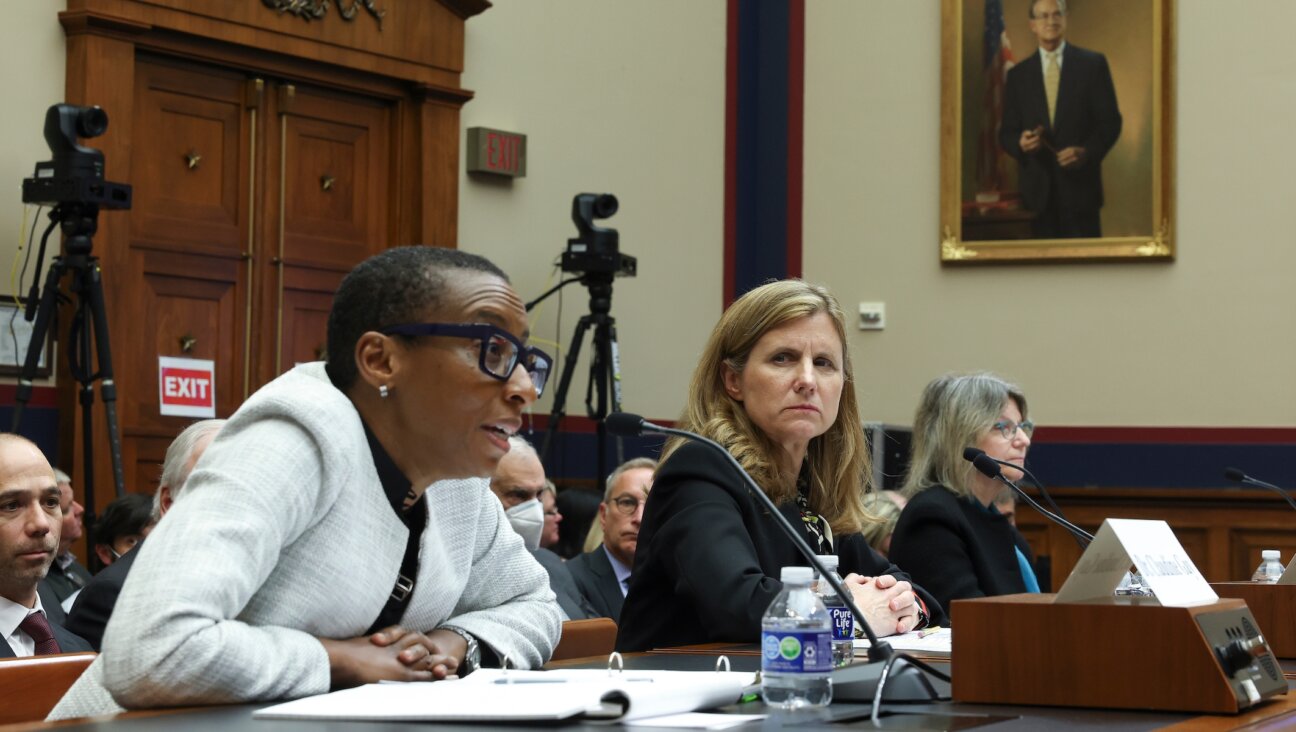ADL: As antisemitic incidents skyrocketed in US, other countries saw a decline in 2022
A new ADL report paints a complicated, at times incomplete picture of global antisemitism

People listen to Joseph Borgen, a victim of a hate crime, speak during a rally denouncing antisemitic violence on May 27, 2021, in Cedarhurst, New York.
The Anti-Defamation League’s annual global report on antisemitism shows declines in incidents in several Western nations in 2022, including France, Germany and Britain — but not the U.S.
The report, despite the notable decreases, paints an overall dismal picture of 2022, pointing to ”thousands” of incidents worldwide, “including hundreds of physical assaults.”
Given the lack of a major Israeli military offensive or widespread pandemic lockdowns — factors experts say contributed to spikes in antisemitism in recent years — the persistence of antisemitism is all the more worrisome, the report concludes.
“Unlike in 2021, there were no specific events which can be linked to a rise in antisemitism, which speaks to the deeply-seated nature of Jew Hatred around the world,” said ADL CEO Jonathan Greenblatt in a statement. He called the report “very troubling.”
The report also found that Haredi Jews are the main victims of antisemitic assaults in the West, and that such attacks tend to happen in a small number of urban centers and are most often not premeditated.
The report was cobbled together with the help of a number of groups and agencies — some governmental, some not — that gather data on antisemitism, often using different methodologies. Some countries provide more complete pictures than others. In Argentina, for example, the data focuses mostly on online antisemitism.
In an interview, Greenblatt told the Forward that the different methodologies, metrics and definitions used to count antisemitic acts presented a challenge, but that the goal of the report was not to come up with a singular number of global crimes against Jews in a given year. Rather, the goal is to “identify a broader set of trends, which can then inform different interventions you might consider in order to address the issue and hopefully, decrease anti semitism.”
Among the reports findings:
- Incidents of antisemitism dropped in a number of countries. In the United Kingdom, there were 1,652 antisemitic incidents in 2022, 603 fewer than 2021. Canada, which set a record with 2,799 incidents in 2021, saw that number drop, as did violent crimes involving antisemitism, although exact numbers were not available in the report. Other countries with notable dips included France and Sweden.
- Germany saw a decline in “politically motivated crimes with an antisemitic background,” with 389 fewer incidents, for a total of 2,639. At the same time, there was an increase in incidents of antisemitic violence: from 63 in 2021 to 88 in 2022.
- In addition to the U.S., countries that saw an increase in antisemitism in 2022 include Australia and Switzerland, while Belgium reported the largest rise of any country, percentage-wise. With only 28,000 Jews, 17 antisemitic incidents were reported, more than four times higher than the previous year.
While reductions in antisemitic incidents may seem like cause for celebration, those falls were from historically high levels and are still “incredibly elevated,” Greenblatt said.
“The task that’s now upon is is to try to be a bit forensic about why, for example, things were reduced the way that they were in Germany, to see again, how can we try to identify what works and then scale their strategies?” he said. “One thing that’s relevant to Germany is that the government there has taken has taken demonstrable steps to try to address the expansion of, for example, right-wing extremism in the ranks of the military and law enforcement more broadly. They have taken real steps to try to address those who are espousing antisemitism in the public square.”
In the United States, the ADL’s 2022 audit showed 3,697 antisemitic incidents, the highest number on record since the organization first began keeping track in 1979 — and a 36% increase from the previous year.
The ADL, for its 2021 U.S. audit, changed the way it gathered information on antisemitism by including incidents reported by partner organizations. That methodology, which contributed to a higher total number of cases, was also used for the 2022 report.
One chapter of the report lays part of the blame for the rise in antisemitism in the U.S. at the feet of Republicans. The party in principle opposes antisemitism but in practice many Republican leaders often empower — or refuse to condemn — those hostile to Jews, the report argues. It gives a number of examples, including former Republican President Donald Trump’s dinner last year with internet streamer Nick Fuentes, who is known for denying the Holocaust and other antisemitic views. In January, the Republican National Committee passed a motion condemning Fuentes.
A request for comment from the Republican National Committee was not immediately returned.
New York and London
The 83-page report also honed in on physical attacks against Jews in London and New York, the two cities that saw the largest number of such incidents in 2022. Visibly Jewish people, such as Haredi Jews, were the most frequent targets of attacks, according to the report.
New York police counted 30 physical assaults with an anti-Jewish motivation, with 22 of those occurring in predominantly Haredi Jewish areas such as Williamsburg or Borough Park, Brooklyn.
The Community Service Trust, an organization that provides physical security and training to British Jews, reported 82 physical antisemitics assaults in Greater London.
It is unclear from the report if Haredi Jews were also disproportionately targeted in other cities and countries. But Greenblatt said the findings underscore the need for Jewish community organizations to work closely with local authorities to find better security strategies in areas with large populations of visibly Jewish people.
“I don’t think it’s news to say that the Orthodox community often bears the brunt of antisemitism, because they are visibly Jewish and are often targeted, victimized by harassment or vandalism or violence,” he said. “But to see it confirmed across continents, in two very different political environments, two very different cultural contexts is is really alarming.”
The report also includes case studies of how antisemitism has manifested in several nations, including some, like Japan and Yemen, with tiny Jewish populations. In Japan, which has less than 2,000 Jews, two political parties that have trafficked in antisemitic conspiracy theories have managed to make small electoral gains.
One paragraph in the report’s forward section has already caused a stir: The authors state that while the crimes of Nazi Germany “make the case for a strong, independent Israel” and “warns us how dangerous it is to allow bigotry and hate speech to thrive,” they pivot to making a pointed case against the rise of far-right nationalist parties in Israel itself, saying the lessons of the Holocaust must be applied universally. The authors drew a comparison between Israel’s Jewish Strength party, which follows the teachings of Rabbi Meir Kahane, calling legislation proposed by the party “Nazi-like.”
“The obvious must be stated,” they wrote. “Racism is racism, and Jewish racism is as deplorable as other forms of racism, and
should never be excused or tolerated.”
After the report’s release, a spokesperson for Israel National Security Minister Itamar Ben-Gvir, a member of the Jewish Strength party, accused the ADL of attempting to sow “hate and divide Jews against one another.”
The ADL produced its report with Tel Aviv University’s Center for the Study of Contemporary European Jewry, the first such collaboration between the two organizations, but Greenblatt noted there has been a longstanding relationship, including sharing of data.























